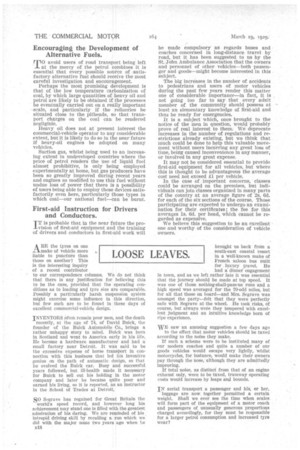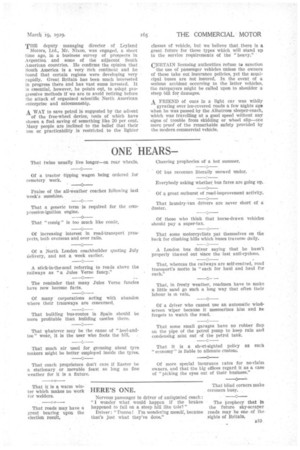LOOSE LEAVES.
Page 44

Page 45

If you've noticed an error in this article please click here to report it so we can fix it.
A RE the tyres on one 171make ef vehicle more liable to puncture than those on another? This
is the interesting inquiry of a recent contributor to our correspondence columns. We do not think that there is any justification for believing this to be the case, provided that the operating conditions as to loading and tyre size are comparable. Possibly a particularly harsh suspension system might exercise some influence in this direction, but few such are to be found in these days of excellent commercial-vehicle design.
INVENTORS often remain poor men, and the death
recently, at the age of 74, of David Buick, the founder of the Buick Automobile Co., brings a rather unhappy story to mind. Buick was born in Scotland and went to America early in his life. Ile become a hardware manufacturer and had a small factory near Detroit. It was said to be the excessive expense of horse transport in connection with this business that led his inventive genius on the path of automatic design, so that he evolved the Buick ear: Busy and successful years followed, but ill-health made it necessary for Buick to sell out his holding in the motor company and later he became quite poor and earned his living, so it is reported, as an instructor in the School of Trades at Detroit.
SO Segrave has regained for Great Britain the world's speed record,. and however long his achievement may stand one is filled with the greatest admiration of his Oaring. We are reminded of his intrepid driving skill by recalling a run which we. did with the major some two years ago when he n13 brought us back from a south-east coastal resort in a well-known make of French saloon bus built for luxury ravel. He had a dinner engagement in town, and as we left rather late it was essential that the journey should be made at top speed. It was one of those nothing-shall-pass-us runs and a high speed was averaged for the 70-odd miles, but for all that those on board—and Mrs. Segrave was amongst the party--felt that they were perfectly safe with Segrave at the wheel. He took risks, of course, but always were they tempered with excellent judgment and an intuitive knowledge born of ripe experience.
WE saw an amusing suggestion a few days ago to the effect that motor vehicles should be taxed according to the noise they make.
If such a scheme were to be instituted many of our modern coaches and quite a number of our goods vehicles would escape very lightly, whilst motorcycles, for instance, would make their owners pay through the nose, although they are admittedly improving.
If total noise, as distinct from that of an engine exhaust only, were to be taxed, tramway operating costs would increase by leaps and bounds.
IN aerial transport a passenger and his, or her, luggage are now together permitted a certain weight. Shall we ever see the time when scales will form part of the equipment of a motor coach and passengers of unusually generous proportions charged accordingly, for they must be responsible for a larger petrol consumption and increased tyre wear?
THE deputy managing director of Leyland Motors, Ltd., Mr. Nixon, was engaged, a short time ago, in a business survey of prospects in Argentina and some of the adjacent South American countries. He confirms the opinion that South America is a very rich continent and he found that certain regions were developing very rapidly. Great Britain has been much interested in progress there and has vast sums invested. It is essential, however, he points ant, to adopt progressive methods if we are to avoid retiring before the attack of organized scientific North American enterprise and salesmanship.
A WAY to save petrol is suggested by the advent of the free-wheel device, tests of which have shown a fuel saving of something like 20 per cent. Many people are inclined to the belief that their use or. practicability is restricted to the lighter classes of vehicle, but we believe that there is a great future for those types which will stand up to the service requirements of the "heavy." • CERTAIN licensing authorities refuse to sanction the use of passenger vehicles unless the owners of these take out insurance policies, yet the municipal buses are not insured. In the event of a serious accident occarring to the latter vehicles, the ratepayers might be called upon to shoulder a steep bill for damages.
A. FRIEND of ours in a light car was wildly gyrating over ice-covered roads a few nights ago when he was passed by the Albatross sleeper-coach, which was travelling at a good speed without any signs of trouble from skidding or wheel slip—one more proof of the remarkable safety provided by the modern commercial vehicle.




















































































































